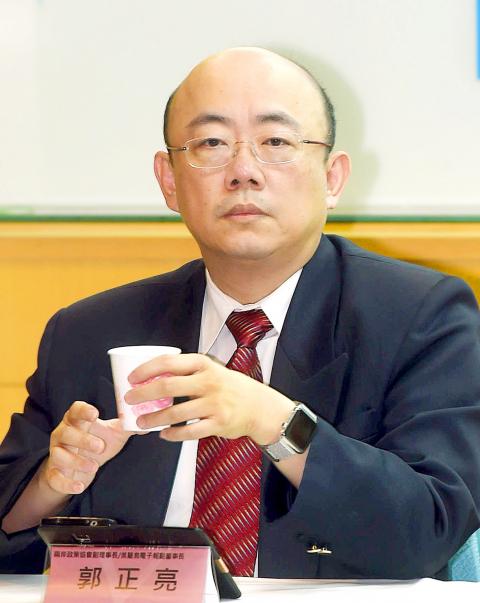Former Democratic Progressive Party (DPP) legislator Julian Kuo (郭正亮), who is to return to the Legislative Yuan as an at-large lawmaker, yesterday denied allegations that he is pro-China, saying that his cross-strait stance is “almost the same” as the DPP’s.
Kuo has been named to replace DPP Legislator Wellington Koo (顧立雄), who has been appointed to head the Committee of Illegal Party Asset Settlement that was mandated by the Act Governing the Handling of Illegal Properties by Political Parties and Their Affiliate Organizations (政黨及其附隨組織不當取得財產處理條例), which took effect yesterday.
In a radio interview yesterday, Kuo said that his position on cross-strait relations is more or less the same as that of President Tsai Ing-wen (蔡英文) and not much different from the DPP’s general position.

Photo: Fang Pin-chao, Taipei Times
He said that he has never supported the so-called “1992 consensus,” a term created by then-Mainland Affairs Council chairman Su Chi (蘇起) in 2000 to refer to a tacit understanding of “one China,” with China and Taiwan each having its own interpretation of what “China” means.
It will be exceedingly hard to cross the current impasse in cross-strait relations before the Chinese Communist Party’s 19th National Congress — which is scheduled for November next year, he said.
Criticism that he is “green on the outside and blue on the inside” or “China-leaning and opposed to Taiwanese independence” are “rubbish,” he said.
His disagreements with government are not meant to target Tsai or Premier Lin Chuan (林全), it is just that he questions whether government policy is too pro-US, he said.
“The DPP is a free and democratic party that tolerates the discussion of different ideas, but when the party’s Central Committee makes a resolute decision, it must be respected. After I return to the Legislative Yuan, I will have the opportunity to communicate directly with Legislative Speaker Su Jia-chyuan (蘇嘉全) and DPP caucus whip Ker Chien-ming (柯建銘),” he said.
Tsai and Lin are not opposed to the promotion of trade in goods with China, but they cannot use the so-called “1992 consensus” as the prerequisite for doing so, Kuo said.
Trade in goods across the Taiwan Strait is normally negotiated through the Economic Cooperation Framework Agreement (ECFA), for which Kuo used to act as the DPP’s spokesman on the issue.
“When all is said and done, Taiwanese businesses cannot omit the Chinese market,” Kuo said.
Kuo has also come under criticism for a drunk-driving offense in February.
He took full responsibility for the incident and would not make the same mistake again, he said, adding that if he were to re-offend, he would resign.

US President Donald Trump said "it’s up to" Chinese President Xi Jinping (習近平) what China does on Taiwan, but that he would be "very unhappy" with a change in the "status quo," the New York Times said in an interview published yesterday. Xi "considers it to be a part of China, and that’s up to him what he’s going to be doing," Trump told the newspaper on Wednesday. "But I’ve expressed to him that I would be very unhappy if he did that, and I don’t think he’ll do that," he added. "I hope he doesn’t do that." Trump made the comments in

NOT AN OPENING: Trump’s violation of international law does not affect China’s consideration in attacking Taiwan; Beijing lacks capability, not precedent, an official said Taiwanese officials see the US’ capture of the president of Venezuela as a powerful deterrent to Beijing’s aggression and a timely reminder of the US’ ability to defeat militaries equipped with Chinese-made weapons. The strikes that toppled Venezuelan President Nicolas Maduro signaled to authoritarian leaders, including Chinese President Xi Jinping (習近平), US President Donald Trump’s willingness to use military might for international affairs core to US interests, one senior official in Taipei’s security circle said. That reassured Taiwan, the person said. Taipei has also dismissed the idea that Trump’s apparent violation of international law could embolden Beijing, said the official, who was not

A cold surge advisory was today issued for 18 cities and counties across Taiwan, with temperatures of below 10°C forecast during the day and into tonight, the Central Weather Administration (CWA) said. New Taipei City, Taipei, Taoyuan and Hsinchu, Miaoli and Yilan counties are expected to experience sustained temperatures of 10°C or lower, the CWA said. Temperatures are likely to temporarily drop below 10°C in most other areas, except Taitung, Pingtung, Penghu and Lienchiang (Matsu) counties, CWA data showed. The cold weather is being caused by a strong continental cold air mass, combined with radiative cooling, a process in which heat escapes from

Snow this morning fell on Alishan for the first time in seven years, as a strong continental cold air mass sent temperatures plunging across Taiwan, the Central Weather Administration (CWA) said. The Alishan weather station, located at an elevation of about 2,200m in central Taiwan, recorded snowfall from 8:55am to 9:15am, when the temperature dropped to about 1°C, the CWA said. With increased moisture and low temperatures in the high-altitude Alishan area, the conditions were favorable for snow, CWA forecaster Tsai Yi-chi (蔡伊其) said. The last time snow fell at the Alishan weather station was on Jan. 10, 2018, while graupel fell there